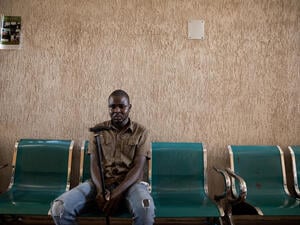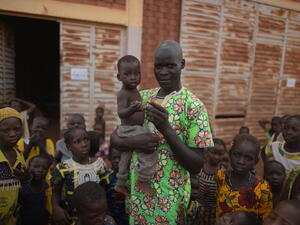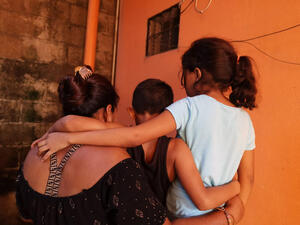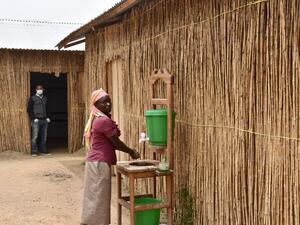Twin blasts in Dadaab raise concerns of worsening security
Twin blasts in Dadaab raise concerns of worsening security

Somali refugees make their way past burning rubbish on a street at Ifo camp in Dadaab, Kenya.
GENEVA, December 21 (UNHCR) - An improvised explosive device went off on Tuesday near the market at the Ifo refugee camp in Dadaab, Kenya. There were no casualties but a police vehicle was damaged. The explosion came just a day after a blast in nearby Hagadera camp killed one police officer and seriously injured two others.
In a statement issued today, UNHCR expressed alarm at the string of recent security incidents targeting the Dadaab refugee complex in northern Kenya. Dadaab is the world's largest refugee settlement and shelters more than 460,000 people.
In total there have been four explosions at Dadaab since October, when three aid workers were kidnapped. The blasts have killed three Kenyan police officers and wounded four others. There have also been threats against humanitarian agencies working in Dadaab. UNHCR condemned these attacks and called for respect for peace and the civilian nature of the refugee camps.
"We are deeply concerned for the well-being and safety of Somali refugees in Dadaab, most of whom are women, children and elderly," said António Guterres, the UN's High Commissioner for refugees. "For the sake of refugees and those who are there to help them, it is of paramount importance to preserve the peaceful and civilian character of the camps."
A deadly mix of conflict, persecution, drought and famine has seen 295,000 people fleeing Somalia this year. More than half have found shelter at the Dadaab refugee camps in Kenya. Others fled to Ethiopia, Yemen and Djibouti.
In Dadaab, development of new sites, registration, deliveries of emergency assistance and services continued uninterrupted throughout the year. However, since October, growing insecurity has crippled the ability of aid agencies to deliver the all but life-saving assistance - mainly food, water and health services. UNHCR and its partners are exploring options to allow full operations to resume.
The situation in Dadaab has been further complicated in recent months by an outbreak of cholera, believed to have started among new arrivals who acquired it in Somalia or en route to Dadaab. Although new cases are now on a downward trend, UNHCR has registered 897 cases, and three deaths, since August. Worsening security, rains and flooding have also made it harder to truck in water to parts of the camps.
Somalia remains one of the worst humanitarian crises in the world. More than 950,000 Somalis live as refugees in neighbouring countries, while another 1.46 million are internally displaced.








